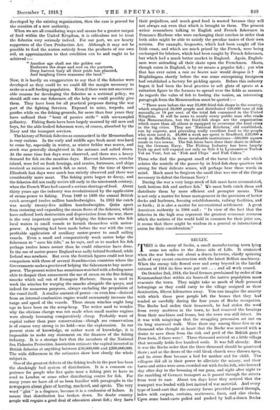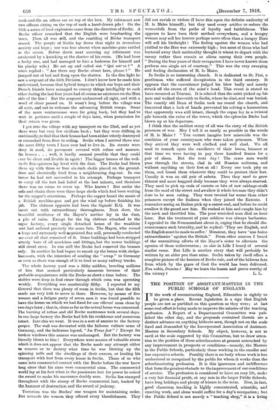SECLIN.
THIS is the story of Seclirt, a small manufacturing town lying some ten miles to the Arras side of Lille. It contained when the war broke out about a dozen factories, chiefly spinning mills of very recent construction with the latest Belfast machinery. When the enemy tide flowed over and away beyond in the fateful autumn of 1914 its fires were put out . . . and all work ceased.
On October 2nd, 1918, the local firemen proclaimed by order of the Kommandant that within six hours all the native population must evacuate the town. They might take as much of their personal belongings as they could carry to the village assigned as their destination, fifteen kilometres away. You can imagine the anxiety with which these poor people left the homes that they had tended so carefully during the four years of Boche occupation. The Boche had stolen their brasswork, he had stolen the wool from every mattress in the town, he had removed the bearings from their machines and looms, but the town was still intact. So it was with misgivings that the straggling procession set out on its long rearward walk. Were there any among those five or six thousand who thought at heart that the Boche was moved with a desire to save them from the risk and peril of the British guns ? Poor fools, if there were ! Three thousand arrived at a little village that normally holds five hundred souls. It was full already. But it was the Boche order that the three thousand should be quartered there ; and so the doors of the cold bleak church were thrown open, and its stone floor became a bed for mother and for child. The villagers did all in their power to alleviate the misery, and their barns and attics were soon crowded out with Seclin folk, who listened day after day to the booming of our guns, and night after night to the rumbling of German transport as it passed through the streets from west to east. About ten days later they noticed that the transport was loaded with loot instead of war material. And every type of hand-cart that the country farms provided passed through, laden with carpets, curtains, mattresses, linen, and also clocks. Upon some hand-carts pulled and pushed by half-a-dozen Boche rank-and-file an officer sat on top of the loot. My informant ,saw two officers sitting on the top of such a hand-drawn pile I On the 15th a series of loud explosions came from the direction-of Seclin. A Boohe officer remarked that the English were bombarding the town. Then all was still, and the rumbling of Boche transport ceased. The people of Seclin lay down that night in tremulous anxiety and hope ; nor was fear absent when machine-guns rattled in the street. Before dawn next morning my informant was awakened by a knocking at the shutter of his room. (He had been a lucky one, and had managed to hire a bedroom for himself and his plucky wife.) He sat up and called out " Qui est' ce ? " A voice replied : " Are there any Boche about here, please ? " He jumped out of bed and flung open the shutter. In the dim light he saw a sergeant of the 55th Division. I don't know how he made him understand, because that hybrid tongue in which our boys and their French friends have managed to convey things intelligibly to each other during the last four years had of course no existence on the Hun side of the line ! But the sergeant understood all right, and with a word of cheer passed on. It wasn't long before the village was all astir, and out to welcome the advancing British troops. Some of the more venturesome were for going back, but they had to wait in patience until a couple of days later, when permission for their return was given.
I got into the village with _my Vansport on the 22nd, and as yet there were but very few civilians back ; but they were drifting in continually,to find that their homes had been either utterly destroyed or ransacked from floor to ceiling. Seclin when I arrived there was the most filthy town I have ever had to live in. Its streets were deep in mud, its pavement covered with refuse and manure. Its houses . . . well, it hardly seemed possible that they could ever be clean and livable in again 1 The bigger houses of the well- to-do flax-spinners lay level with the dust. The Boche had blown them up with three or four six-inch shells placed on the ground, floor and electrically fired from a neighbouring dug-out. In one house he had not succeeded in his attempt. Perhaps transport to carry off the loot had failed at the last minute, and therefore there was no crime to cover up. Who knows ? But under- the sofa and chairs there were three large shells which had been waiting for the sapper's attentions. Perhaps the sapper heard the music of a British machine-gun and got the wind up before finishing his job. The chateau opposite had been the Signals' H.Q. It was burnt out with extraordinary thoroughness. Next door, the beautiful residence of the Mayor's mother lay in- the dust, a pile of ruins. Except for the big chateau attached to the sugar factory, every single detached house of the wealthier sort had suffered precisely the same fate. The Mayor, who owned a large and extremely well-appointed flax mill, personally conducted me over all that remained of it. Some buildings had been stripped utterly bare of all machines and fittings, but the newer buildings still stood erect. In one mill the Roche had removed the brasses only. In another he had begun to smash up the looms with sledge- hammers, with the intention of sending the " scrap " to Germany as soon as there was enough of it to load so many railway trucks.
The whole factory yard was a filthy midden, breeding millions of flies that seemed particularly nauseous because of their probable acquaintance with the Boche so short a time before. The stables were deep in foul straw through which corn was sprouting weakly. Everything was unutterably filthy. I reported to my General that there was plenty of room in Seclin, but that the filth made me very loth to move in there. However, by means of five women and a fatigue party of seven men;it was found possible to have the house on which we had fixed for our officers' mess clean by two days later ; that is, clean as far as the actual house was concerned. The burning of refuse and old Boche mattresses took several days. In one large factory the Boche had left his cookhouse and mesaroom intact. Into this we went. It was in a sort of annexe to the factory proper. The wall was decorated with the hideous vulture arms of Germany, and the ludicrous legend, " Im Treue feet" / Eicept for broken windows this annexe was undamaged. But the factory was literally blown to bits ! Everywhere were masses of valuable stores which it does not appear that the Boche made any attempt either to remove or to destroy what time he was blowing up the spinning mills and the dwellings of their owners, or loading his transport with loot from every house in Seclin. Those of us who came into commercial contact with the Boche before the war knew long since that his aims were commercial aims. The commercial world lay at his feet when in the passionate lust for power he seized the sword to make his assurance doubly sure. Seclin lies stamped throughout with the stamp of Boche commercial lust, backed by the hammer of destruction and the sword of jealousy.
Terrorism was the Boches' one weapon for maintaining order. But towards the women they offered every blandishment. They did not ravish or violate (Thave this upon the definite authority of M. le Haire himself) ; but they used every artifice to seduce the womenfolk from the paths of loyalty and faithfdlness. This appears to have been their method everywhere, and a lumpy, woman may sell her honour perhaps more often than a hungry Esau will sell his birthright 1 The feeling against the women who had yielded to the Hun was extremely high ; but most of those who had bartered away their nationality thought it wisest to depart with the enemy rather,than remain as aliens among their own people. " During the four years of their occupation I have never known them perform one single act of courtesy." This was the very sweeping and feeling declaration of M. Is Madre.
In Seolin is an interesting church.. It is dedicated to. St. Plat, a gentleman who suffered decapitation in the third century. It appears that the executioner judged his blow badly and merely struck off the crown of the saint's head. This event is stated to have occurred at Tournai. It is related that the saint picked up his pate and walked therewith to Seclin, where he died, and was buried. The courtly old Dean of Seclin took me- round the church, and lamented that a lack of hands prevented his salving a harmonium- that apparently was-still intact, though the organ lay in a twisted pile beneath the ruins of the tower, which .the splenetic. Boche had blown up at his departure.
I think that the saddest story of all was the story of the Rritish prisoners of war. May I tell it as nearly as possible in the words of Di. le Make ? " You cannot imagine how miserable was the condition of your countrymen who were taken prisoners. When they arrived they were well clothed and well shod. We all used to remark upon the excellence of their boots, because at that time we were having to pay three hundred francs for a pair of shoes. But the next day ! The same men would pass through the streets, clad in old Russian uniforms, and without anything on their feet at all ! Every one took pity on them, and found them whatever they could to protect their feet. Usually it was an old pair of sabots. Then they used to grow thinner and more haggard daily because they were always starved. They used to pick up ends of carrots or bits of raw cabbage-stalk- from the mud of the street and swallow it whole because they didn't dare to be seen eating. They were treated far worse than other prisoners except the Italians when they joined the Entente. I remember seeing an Italian pick up a carrot-end, and before he could swallow it the guard saw him. He rushed at him and caught him by the neck and throttled him. The poor wretched man died an hour later. But the treatment of your soldiers was always barbarous. I appealed to the Kommandant about it, urging that he should dis- countenance such brutality, and he replied: They are English, and the English must be made to suffer.' Monsieur, they have une haine extraordinaire ' against the-British." From other sources I heard of the unremitting efforts of the Mayor's sister to alleviate the agonies of these unfortunates ; as also in Lille I heard of several similar cases. But Lille is another story that will probably be written by an abler pen than mine. Seclin taken by itself offers a complete picture of the horrors of Boohe rule, and of the-hideous fate from which by the grecs of God the world has been delivered. Non. nobis, Domine May we learn the lesson and- prove worthy of











































 Previous page
Previous page